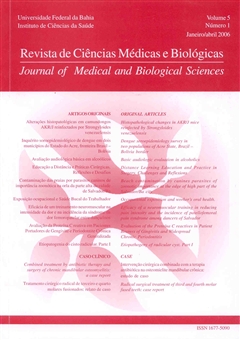Alterações histopatológicas em camundongos AKR/J reinfectados por Strongyloides venezuelensis
DOI :
https://doi.org/10.9771/cmbio.v5i1.4564Mots-clés :
Strongyloides venezuelensis, Camundongos AKR/J, Histopatologia, Dexametasona.Résumé
Camundongos da linhagem AKR/J reinfectados por 500 larvas filarióides L3 de Strongyloides venezuelensis apresentaram reação inflamatória nos pulmões no 3º dia e no intestino no 7º dia após a reinfecção em relação aos animais somente infectados, não verificada quando esses animais foram submetidos ao tratamento pela dexametasona. Os resultados indicam que a reação inflamatória nos pulmões e no intestino exerce um papel importante na diminuição da população dos parasitos durante o processo de reinfecção pelo S venezuelensis em camundongos AKR/J. Quando esses camundongos foram submetidos à terapia pela dexametasona, a resposta inflamatória apresentou-se diminuída ou suprimida, apesar de ocorrer um grande número de parasitos.
Téléchargements
Téléchargements
Publiée
Comment citer
Numéro
Rubrique
Licence
A Revista de Ciências Médicas e Biológicas reserva-se todos os direitos autorais dos trabalhos publicados, inclusive de tradução, permitindo, entretanto, a sua posterior reprodução como transcrição, com a devida citação de fonte. O periódico tem acesso livre e gratuito.






